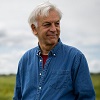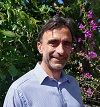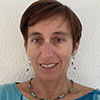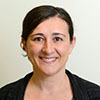Sainsbury Laboratory Symposium 2024
Development — Reprogrammed
17-19 September 2024 | Cambridge UK In-person and online live stream
Registration now open!

Symposium overview
The theme for the 2024 Sainsbury Laboratory Symposium is “Development - Reprogrammed”. Throughout plant evolution, and notably during crop domestication, the processes and mechanisms underpinning plant development have undergone changes. Additionally, plants are remarkable in their ability to adapt their development to environmental cues such as temperature, light, drought, and plant-inhabiting microbes. This Symposium aims to unite researchers from various disciplines who work with a wide range of species from around the world, all with an interest in understanding developmental variation be it genetically-encoded plasticity or genetically-selected by nature, breeding or rational design.
The four topic areas are:
Reprogramming by Evolution
Over millions of years, plants have undergone intricate genetic changes that have shaped their growth patterns, morphology, and reproductive strategies. This reprogramming is evident in the diverse array of plant forms we see today, from towering trees to delicate flowers. In this session, we’d also like to hear how environmental pressures, such as climate shifts and interactions with other organisms, have played a pivotal role in driving these developmental adaptations.
Reprogramming by Domestication
The domestication of crops has led to a targeted and deliberate reprogramming of their development, driven by human selection pressures. Over millennia, as agriculture emerged, humans began cultivating and breeding plants to enhance desirable traits such as yield, nutritional content, and resistance to pests. This selective pressure has influenced the genetic makeup of domesticated plants, altering their growth habits, reproductive strategies, and overall morphology. This session’s focus is the process of artificial selection and how humans have essentially guided the course of plant development, shaping species to meet specific agricultural needs.
Reprogramming by Environment
The reprogramming of plant development in response to their abiotic and biotic environment reflects the interplay between genetic predisposition and external stimuli. Abiotic factors such as temperature, light, and soil composition, as well as biotic factors like interactions with other organisms, exert selective pressures that drive adaptive changes in plant physiology and morphology. This session will feature presentations showcasing the complex molecular mechanisms underpinning adjustment of plant developmental pathways to optimize survival and reproduction in specific environmental contexts. A dynamic responsiveness allows plants to exhibit a remarkable degree of phenotypic plasticity to navigate and adapt to the diverse challenges presented by their surroundings.

Reprogramming by Engineering
By precisely manipulating specific genes, biotechnological approaches enable scientists to tailor plant development for improved yield, resilience to environmental stress, and enhanced nutritional profiles. In this session we will showcase the cutting-edge approaches and how they harness the potential to revolutionise agriculture by customising the intrinsic developmental processes of plants, paving the way for more robust and adaptable crop varieties. We also discuss the responsible implementation and thorough consideration of ethical implications to ensure that bioengineering practices prioritise sustainable and beneficial advancements in plant development.
Keynote Speakers

Professor Keiko Sugimoto
RIKEN Center for Sustainable Resource Science
Cell Function Research Team website
@K_Sugimoto_Lab

Professor Zachary Lippman
Cold Spring Harbor Laboratory
Lippmann Lab website
Invited Speakers

Benjamin Blackman, UC Berkeley
Blackman Lab website

Devin O'Connor, Pairwise
Pairwise website

Caixia Gao, Chinese Academy of Sciences
Gao Lab website

Eric Giraud, Institut de Recherche pour le Développement (IRD)
Plant Health Institute Montpellier

Jorge Dubcovsky, University of California Davis
Dubcovsky Lab

Jorge José Casal, Instituto de Investigaciones Fisiológicas y Ecológicas Vinculadas a la Agricultura (IFEVA)

Laura Moody, University of Oxford
Moody Lab website
BlueSky | X | LinkedIn

Laura Ragni, Universität Freiburg
Website profile

Ross Sozzani, North Carolina State University
Website profile

Yuki Hirakawa, Hiroshima University
Hirakawa Research Group
Symposium coordinators
Contacts
For all enquiries, please contact the Sainsbury Laboratory events team on sls@slcu.cam.ac.uk.
Key Dates
- 29 March: Registrations open
- 29 April: Abstract submission deadline
- 13 May: Talk and poster acceptance notifications sent out
- 04 August: In-person and online standard attendance registration payment deadline
- 26 August: In-person late attendance registration payment deadline
- 16 September: Online late attendance registration and payment deadline
Registration changes and cancellations
Up to and including 19 August 2024: Changing from in-person to online attendance will have the fee difference refunded. Cancellations will be fully refunded minus a transaction charge.
From 20 August 2024: For changes and cancellations please contact sls@slcu.cam.ac.uk.
Day 1:
The event starts at 13:30 and ends at 19:45 and will include a keynote, talks and a combined poster session and dinner at SLCU.
Day 2:
Starts at 9:00 and will include talks, a lunchtime poster session, group photo and a formal dinner at Downing College.
Day 3:
Starts at 8:30 and ends after 12:45. The day will include the opportunity for early career researchers to have breakfast with conference speakers, talks including a keynote, tours of SLCU facilities and a picnic lunch in the Botanic Garden.
| Roles | Fee (on or before 04/08/24) | Fee (after 04/08/24) |
| PI | £400 | £475 |
| Students and Postdocs | £300 | £375 |
| Industry | £475 | £550 |
| Online delegate | £50 | £75 |
Online attendance includes access to the conference abstract book, talks, and the conference Teams site for chatting with other delegates only.
In person registration includes access to the full programme and all listed catering and social events.
Register using this link.
Abstract Submissions
We particularly welcome abstract submissions from early career researchers, women, people from ethnic groups underrepresented in science and/or resource-limited countries as they are currently under-represented in scientific research meetings. We will be promoting our Symposium to a diversity of research institutions and countries. If you know of any people, research groups or institutions you think would be interested in presenting a short talk and/or poster, please share this website with them or contact us at sls@slcu.cam.ac.uk.
Options for participating
You can submit an abstract as part of the registration process. Abstracts submitted by people who have not registered will not be considered.
You must submit a 250-word maximum abstract if you wish to be considered for presenting a short talk, flash talk or poster.
-
Short Talk: 15-minute talk
-
Flash Talk & Poster: 3-minute talk and poster presentation
-
Poster Only: poster presentation
Important points for submitting an abstract:
- Download the Abstract Template (downloads a .docx file) and follow the formatting and 250 word limit.
- Name your abstract file as your full name as used when publishing scientific papers.
- Your topic should broadly align to the symposium theme Development- Reprogrammed.
- Abstracts may not be edited/updated after they are submitted.
- Your abstract should be submitted in English.
- Please only submit one abstract.
- The submitting author will receive all correspondence about the abstract so we advise that the presenting author is the person who submits the abstract.
- Submission of an abstract acknowledges your acceptance for the abstract to be published in the official symposium publications.
- The presenting author must ensure that all co-authors have approved the abstract content and to its submission to be presented.
Confirmation of abstract submission
Your abstract is not successfully submitted until you receive a confirmation email after clicking the final submit button as part of the registration process. If you do not receive a confirmation email, please contact us at sls@slcu.cam.ac.uk.
Notification that your abstract has been accepted
Each abstract will be reviewed by the Symposium Coordinators. Notification of acceptance or rejection of submitted abstracts will be sent to applicants via email by Monday 13th May 2024. Full instructions concerning talk and poster presentations will be sent to presenters.
Information coming soon.
Instructions for Poster Presenters
If you are selected to present a poster, please bear the following in mind:
Please ensure you have the consent of all contributors to your poster to share the information on it and that you have appropriate copyright permissions in place.
Please indicate any preference for a specific poster session time (lunchtime or evening).
Your poster should be portrait orientation and B1 size (707 x 1000mm / 27.83 x 39.37 inches). We will provide poster boards and velcro dots for your use.
Here are some suggestions for creating accessible, engaging posters:
https://guides.library.yale.edu/academic-poster-resources/accessibility
The Venue
Sainsbury Laboratory
University of Cambridge
47 Bateman St, Cambridge CB2 1LR
The Sainsbury Laboratory building
- Step-free access to building and to all venue spaces (fully wheelchair accessible)
- Accessible gender-neutral self-contained toilets
- Prayer/Reflection Room
- Family Room
- Lactation Room
Auditorium
- Step-free access
- Audio induction loop
Transport
-
Train: The Camnbridge Rail Station is 0.5 miles from the Sainsbury Laboratory along a relatively level sealed pathway.
-
Parking: There is no car parking available at SLCU other than two spaces reserved for those who require disabled access. If you need to park in the area, full-day pay and display parking is available at the Cambridge Rail Station (0.7 miles) and Trumpington Road (0.3 miles), which are both reached via a relatively level sealed pathway.
-
Bicycle facilities: Bicycle parking is available in stands on-site.
Internet access
Free wifi access is available onsite and throughout most of Cambridge city via Eduroam or as a UniOfCam-Guest. You can connect to UniOfCam-Guest by registering by email or through your Amazon, Facebook, Github or LinkedIn account.
On-site facilities for children and carers
We have a number of onsite facilities and resources to support attendees and their families. While we are not able to provide on-site childcare, we have a dedicated family room and private lactation room with refrigerator for milk storage - both accessible at any time and located very close to the auditorium. We also provide a number of baby/toddler furniture items, such as highchairs, toilet seat and changing table.
Please contact events@slcu.cam.ac.uk if you have any questions or suggestions for ways that we can support you during the event.
Junior Delegates
Children will be issued with a Junior Delegate pack including a name badge (first name only, with emergency contact details on the back) and some activities that they might enjoy. Children must be accompanied by a parent or carer at all times.
Family Room (Darwin Room)
A multi-use room will be a dedicated space for families to use during the day. This room has soft lounges, table and chairs, soft floor coverings and is a suitable space for carers to use when supervising young children or for childminders/partners/carers to use while the event is in progress.
There are also baby changing facilities, toddler toilet seat and highchairs available on site.
Lactation
Breastfeeding is welcome in all public areas of the building. We also provide a private room for nursing and pumping with a separate fridge for milk storage.
Access to the Botanic Garden
The Lab is surrounded by the Cambridge University Botanic Garden, a traffic free area with a café. Please contact the conference organisers so we can arrange for free access to the Garden for your partner/childminder during the conference.
Suggested activities for children
We are gathering ideas and suggestions from local families and will list nearby parks, activities and child friendly cafes and restaurants on this page closer to the date of the conference.
Local Attractions
Please find below links to a number of family-friendly attractions within walking distance of the symposium or accessible by public transport.
University of Cambridge Museums and Botanic Garden
- Cambridge University Botanic Garden
- Museum of Archaeology and Anthropology
- The Fitzwilliam Museum
- Museum of Zoology
- Sedgwick Museum of Earth Sciences
- Museum of Classical Archaeology
- Kettle's Yard
- The Polar Museum
- Whipple Museum of the History of Science
Cherry Hinton Hall Park (duck ponds)
Nene Valley Railway (home to Thomas)
Sheep's Green (play park)
Accommodation in Cambridge
In Cambridge there are multiple options for accommodation including hotels, bed and breakfasts, guesthouses, college rooms, and serviced apartments. The symposium will be held during the University of Cambridge summer break and so colleges may have single student rooms available. To find suitable accommodation, we recommend checking the following hotels and websites:
Getting to Cambridge
Train
The city of Cambridge is easily accessible by train, with the primary station located about a mile from the city centre, which takes approximately 20 minutes on foot. The Sainsbury Laboratory is located only 1 km, or 0.6 of a mile, from Cambridge Station.
For train schedules and ticket reservations, visit National Rail Enquiries or Trainline.
Driving
There is no car parking available at SLCU other than two spaces reserved for those who require disabled access. If you are planning to drive to Cambridge, we recommend you either book accommodation that includes parking or use the Park & Ride scheme. If you need to park in the area, full-day pay and display parking is available at the Cambridge Rail Station and Trumpington Road (0.3 miles). For more information, please visit www.cambridge.gov.uk/parking.
Bus
Local bus services usually run to/from Cambridge bus station in Drummer Street, and/or the adjacent Emmanuel Street and St Andrew’s Street. There are frequent buses from the railway station to the city centre.
The 'U' Universal bus service bus service runs from Eddington, next to the Madingley Road Park and Ride site, through to our Biomedical Campus from Monday to Saturday, and from Eddington to Cambridge Railway Station on Sundays.
Please help share the word about the Sainsbury Laboratory Symposium by distributing the A4 poster.
A4 Poster (PDF)
PowerPoint slide (downloads pptx file )






